Training a Jack Russell puppy doesn’t have to be hard work. If you are constantly saying no, stop doing that, leave it, stop chewing my slippers etc. and stressing both you and your new pup out, STOP, there is an easier way! Knowing how to train a Jack Russell puppy the right way can be a fun experience with training games. Jack Russell puppy training games will help you and your pup create rules and boundaries while keeping things fun.
This post may contain affiliate links: Read more here.
The 3 types of games to tire out a Jack Russell terrier

Chill games can be played on repeat to instil that calm and relaxed manner that we want from our grown up pups.

High energy games take a little more concentration, repeat just a few times making sure your pup doesn’t get too excited and has plenty of opportunity to wind down and rest afterwards.

These games are sure to impress friends and family. Crufts worthy tricks that provide an important basis for a well behaved pup.
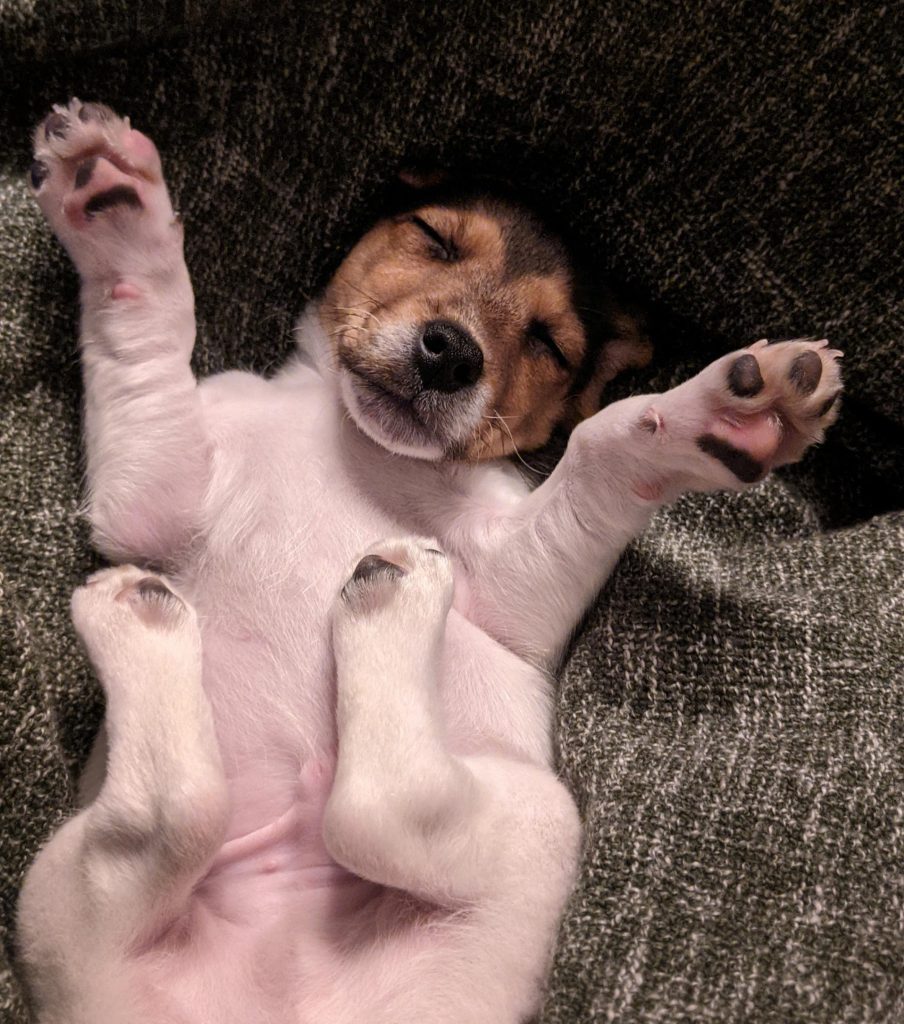
Remember puppies need between 17-20 hours of sleep a day, they don’t always seem to realise this, so it’s your job to say when it’s time for a nap.
Top Jack Russell puppy training tips
- Measure out food for the day and use it for rewarding good behaviour. Don’t worry about fixed meal times, just make sure your pup is getting through enough food in the day.
- Training should be fun, if you start to get frustrated, stop.
- Try not to call your dog to you to do something that they may see as negative – like telling them off for eating something (this can be trained by teaching your pup “Give/Ta”).
The 5 best games to play with a puppy
1. Focus on me – High Energy
Knowing how to train a Jack Russell to listen is the first step in any training. Using normal food, throw or bowl food for your puppy to retrieve. When they look back at you or return to you for more food, reward them with verbal cues like their name or “good boy” then repeat. Throw a little further each time, making sure your puppy looks back, or returns if working on recall, each time before throwing the next one.
2. My bed/crate is the best – Chill
This game can work with a dog bed or crate or both. Say “Bed” and point or tap on the bed until all four legs are in the bed. Reward with a treat and plenty of verbal praise. This will come in very handy later when puppy needs to stay out of the kitchen or sit calmly when doing the hoovering. You can also reward with treats anytime your puppy is calmly sitting in bed, and even scatter treats under blankets to build the positivity of being in bed.
3. What’s that noise? – Chill
The first couple of weeks your puppy will be nervous and fearful of everything. A great way to build confidence is to test out noises while positively reinforcing them with verbal praise or treats. For example, turn on the hairdryer, hoover or lawnmower but don’t move them just yet. Simply sit calmly and praise them for ignoring it. Give treats when they are calm, play with their favourite toy, and even build up to walking past the noisy object when they are confident enough.
This game can continue by using the TV, radio and even puppy socialisation playlists (think sirens, car noises and fireworks) to get your puppy ready for all sorts of weird noises they might hear when out and about. This way instead of being scared when in a new situation, they know there’s nothing to be afraid of before they even leave the house.
4. Chase me – High Energy
This game practises your dog’s proximity with you, helps with recall and on lead training later in life. Simply (carefully) run out of the room and wait for your pup to chase you. When they come to find you reward with lots of affection or treats, they may seem a little confused at first but it soon turns in to a really fun game for everyone involved.
This can be added to later once they have tried on their collar and lead a couple of times (with lots of treats and a loose lead). Whilst they are on a loose lead try jogging again while they run alongside you, any distance is an achievement, never force your pup to go further than they want to and give loads of praise when they run with you on the lead.
5. Cardboard Kingdom – Chill
It’s no secret puppies like to chew things so having things they can chew on seems obvious. Teething toys, Kong’s and soft toys are great but there’s nothing quite like having something to tear up! A cardboard box big enough to be a den is also great for creating a safe place your pup can hide if they’re feeling a little overwhelmed. Build confidence by throwing treats inside the box, creating cardboard obstacle courses (not too high off the ground in case they fall), and ripping bits up to play with.
More Jack Russell training tricks…
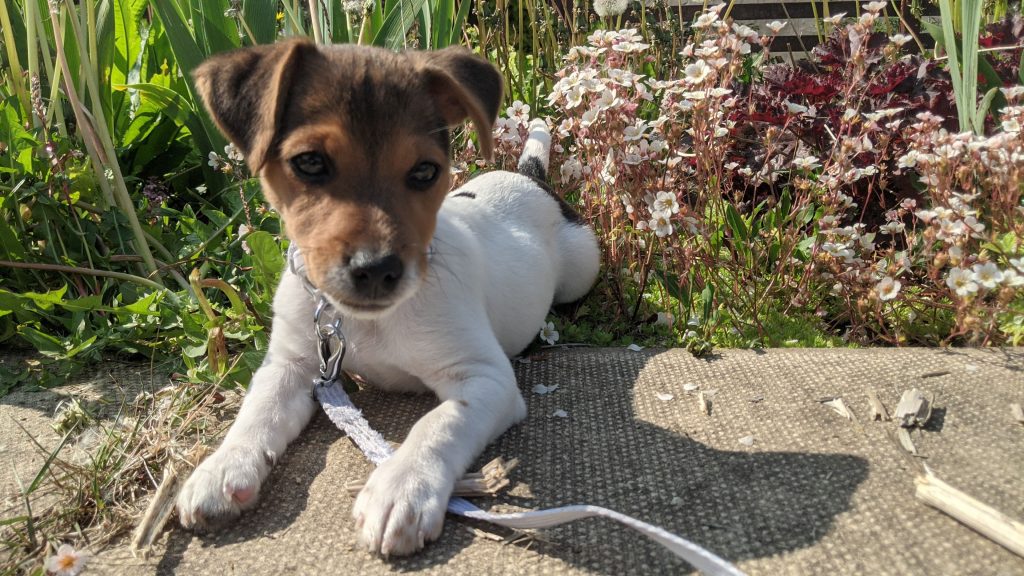
6. Little spy – Chill
This one’s super important for teaching your pup not to get overexcited by every stranger walking by. Sit at the window, in the garden, or in a parked car and simply watch the world go by. We don’t need to go and say hello to everyone just calmly watch as the world goes about its business. Reward with tasty treats anytime your pup is being calm. Don’t shout if they bark (this actually is just confirming to them there is something to be worried about) just calmly sit and reaffirm they are safe.
People often mistake a wiggly, excited dog as pleased to see someone. When actually it’s just typical submissive behaviour, rolling on their back doesn’t mean they want a belly rub, it means I’m not a threat, don’t hurt me!
7. Fetch – High energy
An oldie, but a good one. Tricks to keep this game exciting are to only play once a day and remove the ball from reach when not playing, that way it’s a real treat when they get to play fetch. Lots of encouragement, encourage them to sit before you throw and only reward with a treat once they deliver the ball back to you. Don’t play this game for too long as it can be a tiring game for little legs!
8. Sit and stay – Classic
Knowing how to train a Jack Russell to sit is training 101. Hand signals really help when mastering these basic commands. Have a treat ready and put the back of your hand towards your pup until they sit, reward even if they only manage half a sit at first. Once sit is mastered stay is not that far off. Calmly with a relaxed tone of voice repeat “Sit, stay, sit, stay,” while you edge further away, a flat hand pointed toward your pup works a treat. Release the stay with something like “Come on then” in a happy tone and pat the floor or your legs. Reward with lots of praise and a few treats, each time working on how far away you can get. If they get up too early use a noise that stops them in their tracks like “Bup, bup, bup” and repeat sit, only resuming the game once they are back to sitting calmly.
9. Come – Classic
Training a Jack Russell to come when called is of course so important for happy walks. It’s a hard one to master and there are so many distractions in the big, wide world for a little pup. If you can start this in the first few weeks you have a lot better chance of having good recall when outside. The aim is to have something better to offer that whatever they are doing. Be it a tasty treat or a load of happy positive attention. Call “Come” or their name from the same room, then a different room, then outside and give them all of the praise when they make it back to you. Extra points if you can touch their collar, as this will be especially handy if you need to put a lead back on when out and about.
10. Give/Ta – Classic
This one requires a constant pocket full of tasty treats! Puppies explore their world with their mouths, it’s important to let them as much as possible, they will work out that a woodlice isn’t edible. But it’s good to have a system in place if you need to check what they are eating or take it away. When your pup has found something interesting to nibble on, offer up an irresistible treat and say “Ta” or “Give”, remember to keep it calm and consistent. If they can nibble safely give them it back, if not give them another treat just for being so good!
If you want to know how to stop a Jack Russell puppy from biting read more here including how to toilet train a Jack Russell puppy, toes, teeth and bath time and more tips and tricks;
How to train a Jack Russell puppy the basics.
The golden rules of training a Jack Russell puppy
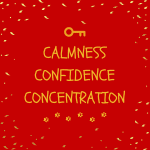
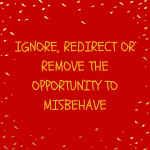

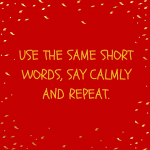
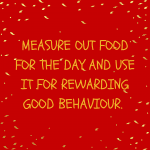
The 3 C’s – Calmness, Confidence & Concentration. These are the three important behaviours we want to give our pups in all aspects of life. To be calm when we are busy or leave them alone, to be confident with new noises and new surroundings, and to be able to concentrate when we need them to do something.
Get rid of the food bowl, dogs always need access to water but food is earned. Use it to reward good behaviour and to keep themselves busy when you’re not around.
Puppies don’t misbehave, life is a game and they don’t yet know the rules. If they can’t stop chewing a rug, put it away for a few weeks. If they love to chew your clothes, redirect them to their favourite chew toy.
Use the same short words, say calmly and repeat. Pups wont understand if you say “stay, good boy, don’t move, no go back, oh no!”, keep it simple with “stay, stay, stay …. ok come!”. Repetition is essential for a puppy to learn.
Remember patience is a virtue. Raising a puppy is hard, and believe me we know it’s difficult to keep your cool sometimes. Make games fun & happy, don’t tell your pup off when it’s not going well. Stop, rethink and start again later when you are both more relaxed.
The Jack Russell Puppy eBook
Reward based games are the best way to train a Jack Russell puppy
It’s a fact that reward based training is more effective than any telling off, plus it’s a lot less stressful! All of these games can be played in the first couple of weeks with your new puppy, but can also be used and expanded upon throughout their lives. It’s important to remember that each pup is different and some take longer than others to pick things up, and that’s ok. Above all else remember your puppy is a baby. They don’t mean to bite too hard, chew your favourite shoes or poop on your new rug. They are learning the rules and rely on you to positively reinforce when they are behaving like you want them to. If they aren’t simply ignore, redirect or remove the opportunity to misbehave. Any negativity will only damage your relationship and can even make them fear you and hide bad behaviours, then start them again when you are out of the house.


